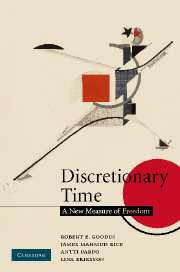Book contents
- Frontmatter
- Contents
- List of figures
- List of tables
- Preface
- Part I Introduction
- Part II Time pressure
- 4 Time pressure: a new problem?
- 5 Time pressure: a new measure
- 6 Is it really an illusion?
- Part III Welfare regimes matter
- Part IV Gender regimes matter
- Part V Household regimes matter
- Part IV Conclusions
- Appendix 1 Methodology
- Appendix 2 Data
- Bibliography
- Index
5 - Time pressure: a new measure
Published online by Cambridge University Press: 28 October 2009
- Frontmatter
- Contents
- List of figures
- List of tables
- Preface
- Part I Introduction
- Part II Time pressure
- 4 Time pressure: a new problem?
- 5 Time pressure: a new measure
- 6 Is it really an illusion?
- Part III Welfare regimes matter
- Part IV Gender regimes matter
- Part V Household regimes matter
- Part IV Conclusions
- Appendix 1 Methodology
- Appendix 2 Data
- Bibliography
- Index
Summary
There is one striking but seldom-remarked feature of all the discussions of ‘time pressure’ described in the previous chapter. They all talk in terms of what people do with their time – how much of it they spend in paid labour, for example – with nary a mention of why. But surely ‘pressure’ implies compulsion. To say people are under ‘time pressure’ suggests that they are somehow forced to commit as much of their time as they do to the various activities they do, necessarily leaving so little remaining for other things they might do instead.
Sometimes that unspoken assumption is enormously plausible. Subsistence farmers simply have to work as long as it takes to get their crops in, on pain of starvation. Sweatshop workers with no alternative means of subsistence likewise have to work as long as the factory boss demands, or starve. ‘Salarymen’ in Japan might be in the same position: maybe they would indeed be fired, and their families would starve, if they did not put in the long hours Japanese employers expect.
Other people, however, work long hours purely because they enjoy their jobs, or because they have nothing else to do. Or they spend long hours preparing gourmet meals just for fun. Thus, simply looking at how much time people spend at work (for pay or at home) without asking why – which is what standard discussions of ‘time pressure’ invariably do – is a very imperfect way of assessing how much ‘time pressure’ people are really under or how ‘time poor’ they really are.
- Type
- Chapter
- Information
- Discretionary TimeA New Measure of Freedom, pp. 81 - 98Publisher: Cambridge University PressPrint publication year: 2008

